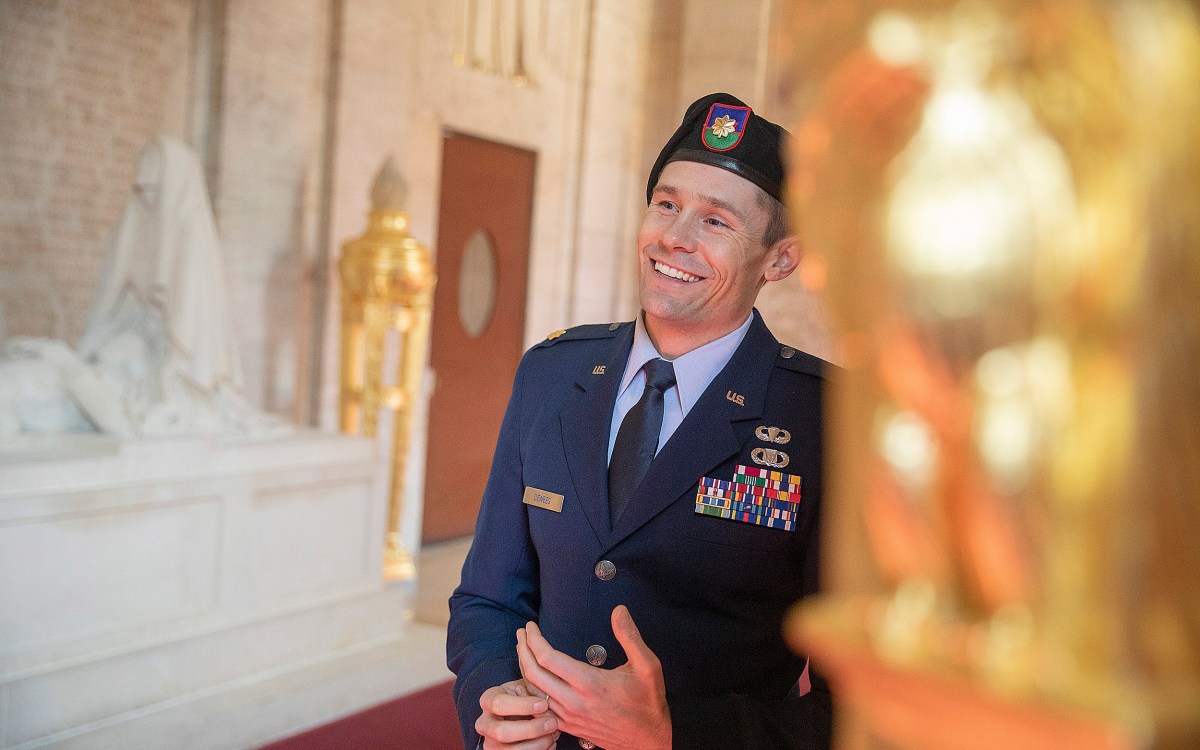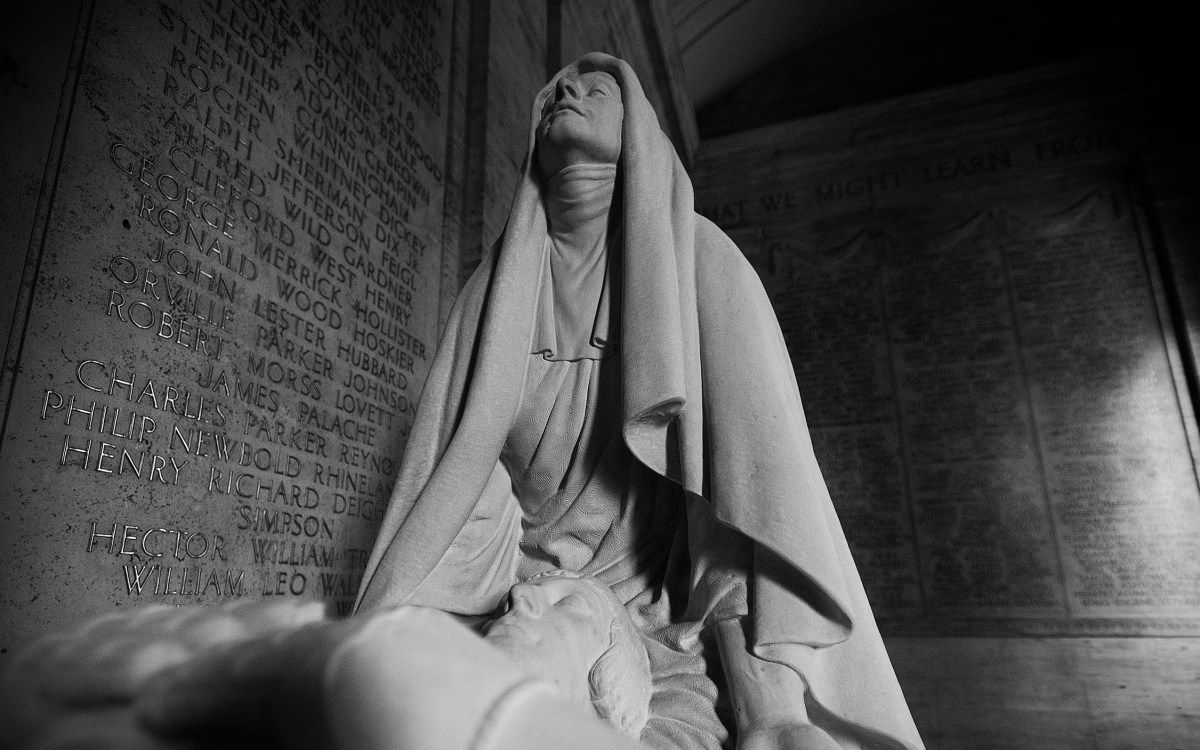Photos by Rose Lincoln/Harvard Staff Photographer
From the service to school
Veteran transfer students from community colleges make Harvard home
Harvard College admits an average of 12 transfer students per year from a pool of about 1,500, and veterans represent a growing segment within this select population. These four vets came to Cambridge by way of an enriching community college experience after — and in one case before — serving in the Army, Navy, Marine Corps, and Air Force.
Professors say they are impressed by how these students approach their work with a sense of purpose and urgency. David Laibson, Robert I. Goldman Professor of Economics, called Jesse Carlos “one of the most intellectually engaged students in a class of over 600,” and James Casey’s expository writing professor Willa Brown expressed her good fortune to have the vet in her class this way:
“He has a sense of self that gives him the confidence to not only speak up when he has an idea, but also when he has a question, and he is a natural leader for his classmates, even when he’s being self-deprecating. But most of all the impressive thing about Jimmy is his dedication to his own education. Having studied in community college, and having served in the armed forces, he is ready to take responsibility for getting the most out of his opportunities.”
Alex Walsh ’22
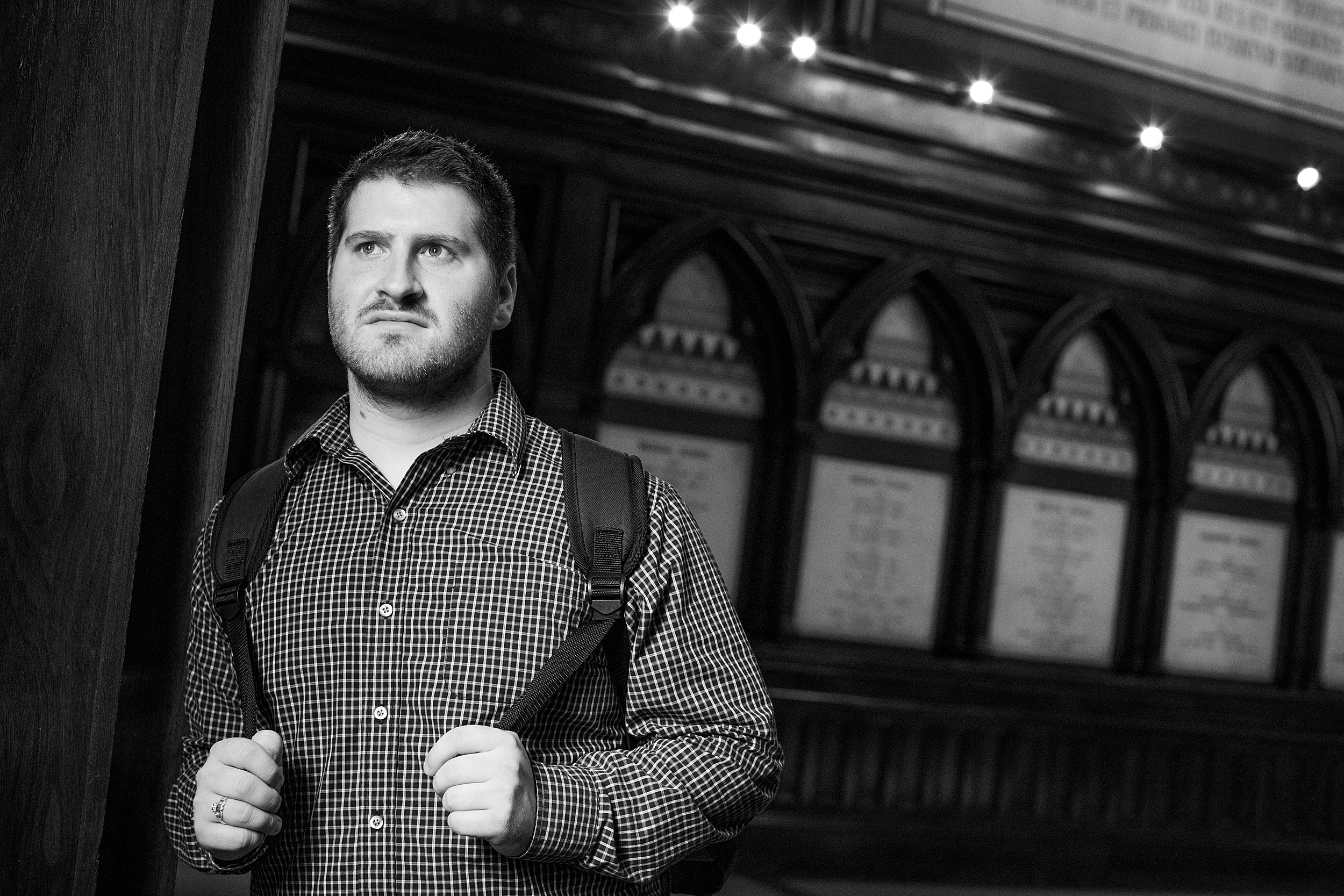
“People are a lot more accepting of all walks of life here. They come from different parts of the world; they all have their own story, and I’m adding mine.”
With his parents unable to cosign student loans, Walsh started his college career at Northwestern Michigan College in his hometown of Traverse City. He immersed himself in classes and clubs, becoming news editor for the school paper, and public affairs officer for NMC’s International Club.
“I never had the money to travel, so the international club gave me exposure to what life was like outside the U.S.,” he said.
Walsh earned his associate degree, and, still unable to get student loans, enlisted in the Navy.
“Joining the military felt like a last option,” said Walsh, who deployed as a fire controlman overseas for the better part of six years, including as part of Operation Odyssey Lightning’s Battle of Sirte against ISIS in Libya. “While on deployment, I traveled to 25 different countries and trained with foreign navies around the Mediterranean, Black, and Baltic Seas.”
Walsh expected to return to his home state to finish college, but after earning higher-than-expected SAT scores he took a second look at his options. When a peer ambassador for the veteran nonprofit Service to School encouraged him to “shoot for the stars,” he chose Harvard. This fall, he transferred as a first-semester sophomore.
At 27, the Quincy House resident, who plans to study economics and international relations, is older than most of his undergraduate peers, but said “the age difference doesn’t bother me too much.”
“People are a lot more accepting of all walks of life here,” he said. “They come from different parts of the world; they all have their own story, and I’m adding mine.”
Andrew Ulick ’21
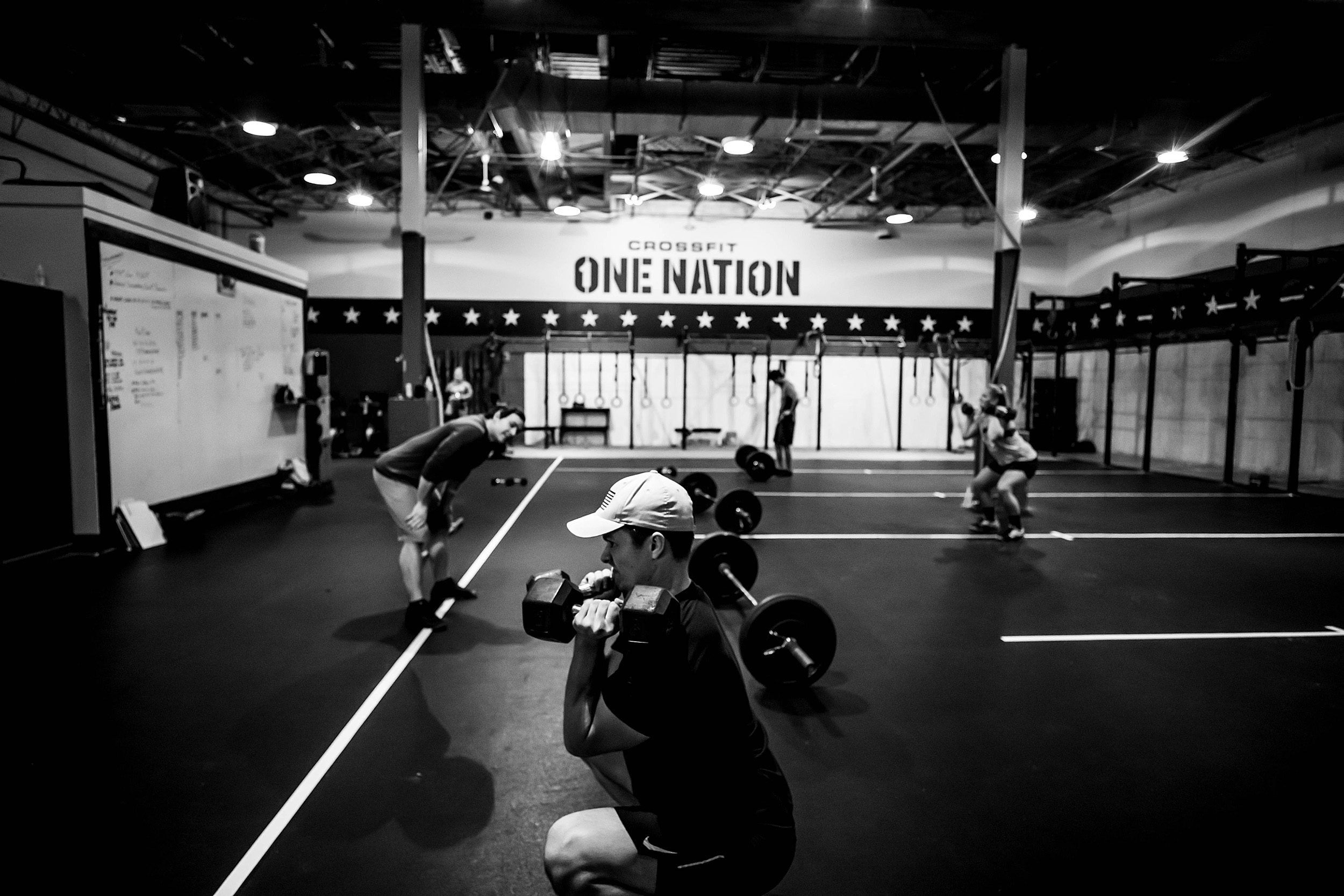
“All I really knew was I wanted to fly.”
Equal parts computer science nerd and rebel, Ulick was in his second semester at the University of Arkansas when he realized things just didn’t feel right.
“Something wasn’t working,” recalled Ulick, a self-described wild child, the product of living in four foster homes from the age 4 to 6 before being adopted. “One of my most positive memories was of my foster father, an Air Force vet, taking me to sit in an F16 on Air Guard Base. All I really knew was I wanted to fly.”
He failed the recruiter’s depth-perception test, but soared with one of the highest scores in the state on the language test, and became a Korean linguist for the Air Force. Secretive work in the Middle East extended his service until 2010, which led to six years of intelligence work for a private contractor in several conflict zones.
But he kept questioning his purpose, and in 2016, left contracting to take a three-month software engineering boot camp. Soon he was attending the City College of San Francisco.
“Not all students at community college are trying, but some are in the middle of a redemption, and it can be a particularly powerful environment,” said Ulick, who took computer science classes, studied with applied math Professor Jamey Bass, and took a course with Stanford lecturer Chris Gregg. “The instructors are wonderful. Jamey was brilliant, and also interested in bringing up the next generation of students.”
At Harvard, the 34-year-old CS concentrator is invigorated as much by the buildings and his classmates as the classes, which have included the Gen Ed course “Tech Ethics,” an introduction to machine learning at MIT, and John Stauffer’s “The Rhetoric of Frederick Douglass and Abraham Lincoln.”
“I didn’t know who Frederick Douglass was until that class,” he said.
In his free time, Ulick powers his body at Cross Fit and is involved with the Harvard Undergraduate Veterans Association (HUVA).
“I don’t feel the need to be involved in everything,” he said. “CS is fairly murderous for me, so it takes me a lot more time.”
James Casey ’22
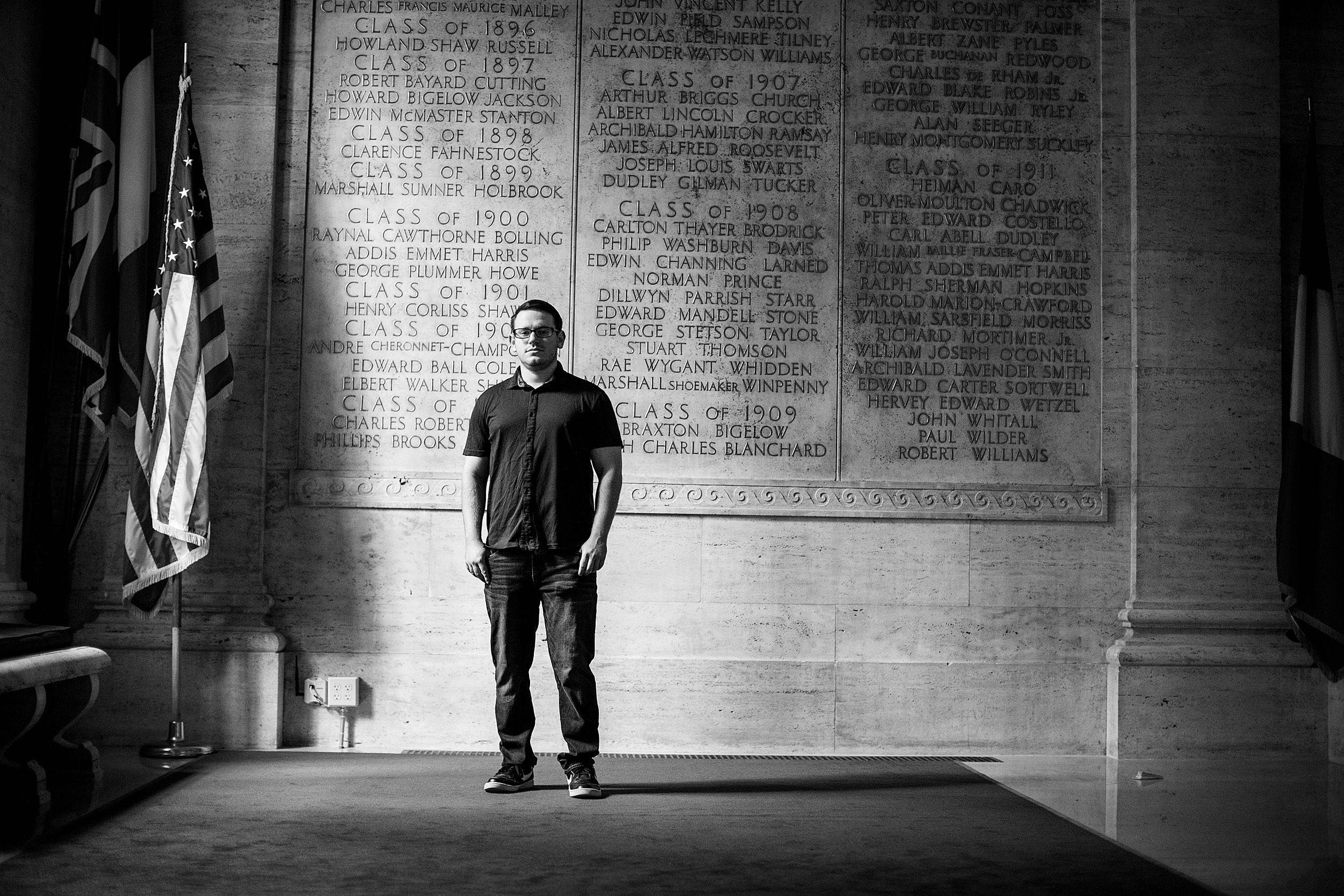
“I didn’t think it was a place I belonged, but being here now is honestly a dream come true.”
The 24-year-old Mather House resident transferred this fall as a second-semester sophomore from Mass Bay Community College where his communication professor, Carolyn Guttilla, encouraged him to aim for an Ivy League school.
“Initially, I laughed it off, but I stewed on it. So three weeks before deadline, I emailed her for help. We both agreed that my odds were slim to none, but I slaved away at the application. Then I got an email to come to the Admissions Office on Brattle Street for an interview, and I knew it was a big deal,” Casey said.
The Natick, Mass., native said Harvard was “the last place I pictured myself six or eight years ago” when he enlisted in the Marine Corps during his junior year of high school.
“My friend Eric and I used to play soldier in the backyard. As I got older, all I wanted to be was a grunt and immersed in the experience of being a grunt. I wanted to be in some kind of combat, front-line role. I wanted to see if I had what it took to fight for my country, not just serve my country,” he said.
Trained as a rifleman (2nd Battalion, 4th Marines), Casey didn’t see the action he’d hoped for and decided not to re-enlist. When he got home in summer of 2017, he took some classes at Mass Bay, became an orientation leader, and PA announcer for the athletics department.
His classes at Harvard “haven’t been exceptionally more difficult, but they are more difficult.” His first course load has comprised “The Ancient Greek Hero,” Expos 20, and “Introductory Psychology.”
“Everybody here only has so much time, and, as a transfer student, I have even less. It’s led to some late-ish nights and some stress, but it’s nothing I can’t handle,” he said. “I’d be lying if I said I didn’t have the misconception that it was hoity-toity people sitting around thinking about how they’re going to spend their money. I didn’t think it was a place I belonged, but being here now is honestly a dream come true. Everyone’s an equal, and what we have in common is our driven personalities.”
Jesse Carlos ’22
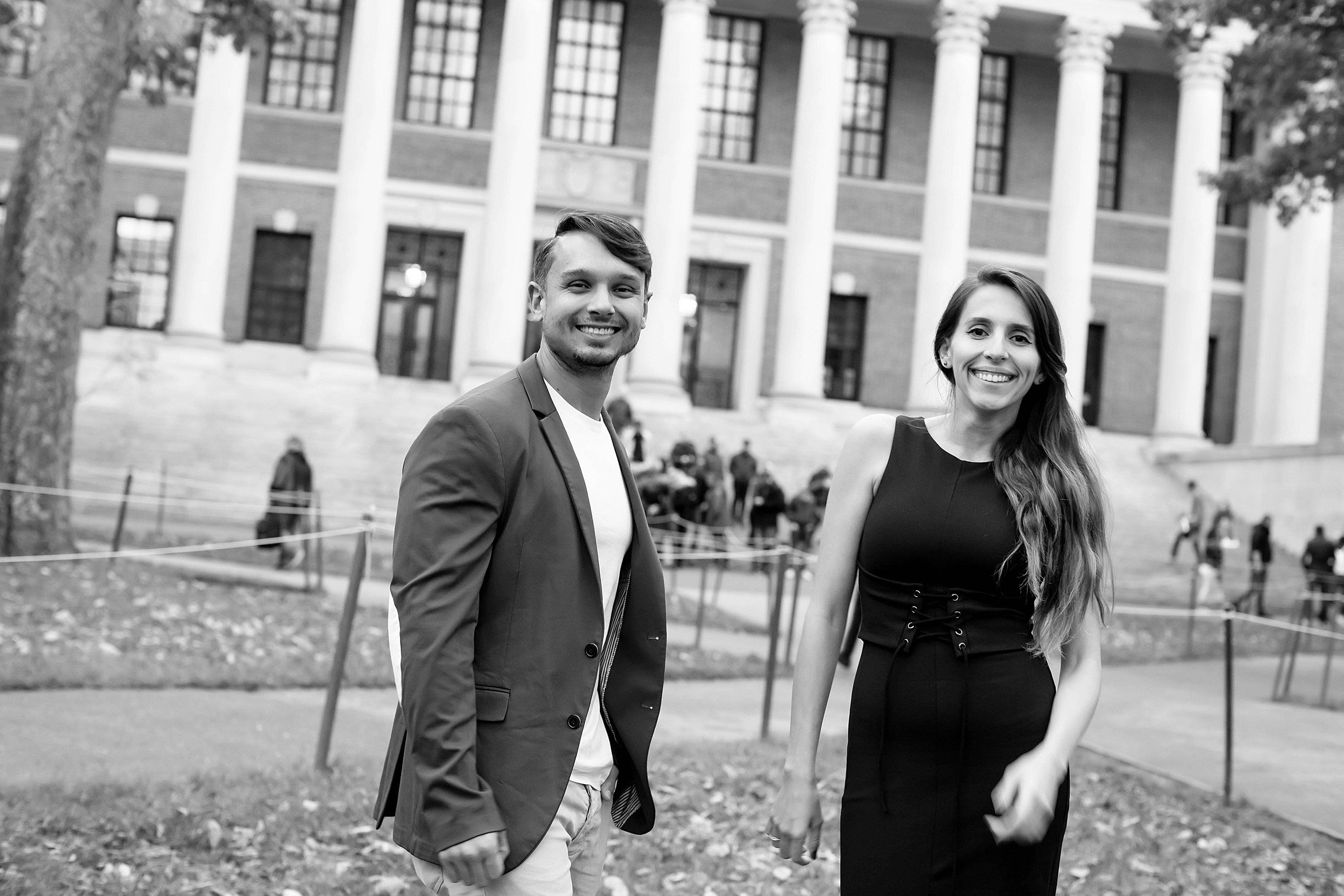
“I wouldn’t have wanted it any other way. I’m learning so much, and I’m so stressed.”
Deciding to join the Army as a special forces recruit wasn’t as simple as watching “Band of Brothers.” But the San Diego native was hoping the Hollywood depiction of brotherhood in military life would be the foundation of his time as an Army Ranger.
Carlos spent the better part of his nine years of service based in Italy, and deployed twice (each time for a year) to Afghanistan as a sniper. Opportunity came during the end of his service at Fort Lewis in Washington when his future wife, Racha Lwali, whom he had met in 2008, and his chain of command encouraged him to attend Highline College in Des Moines.
“I got outstanding grades and engineering awards. I took an SAT prep class with 15-year-olds,” recalled the now-33-year-old. “Six months before transfer applications were due, my wife and I talked about where to apply. She was a DACA student when she got her bachelor’s and master’s in engineering, and since the GI bill covers most of schooling, she said, ‘See if you can get in an Ivy.’”
Carlos said he didn’t know how motivated he was to be a part of Harvard until the acceptance email arrived. Now engrossed in statistics, writing, and economics courses on campus, he called the curriculum and demanding pace of work “motivating.”
“I wouldn’t have wanted it any other way. I’m learning so much, and I’m so stressed. With the stresses I’ve always experienced, you can sit down and just be harder to get through them. You just have to be there. In schoolwork, you have to meet a standard. If you don’t, you don’t succeed. Instead of internalizing, it’s constantly reaching,” he said.



